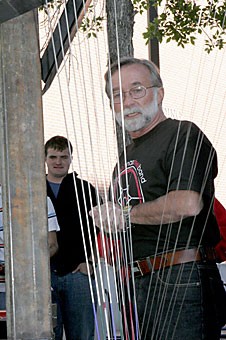Gary Cook is professor emeritus at the School of Music, having taught percussion at the UA for the past 32 years. In addition to starting the steel band program 20 years ago, he founded and directed the department of percussion studies from 1975 to 2006. He currently is teaching a systems and industrial engineering and honors proseminar of 18 students, entitled “”Making Musical Instruments Out of Scrap Metal,”” where students dig through garbage and scrap metal to design and play musical instruments. The class is a partnership among the School of Music, College of Engineering and College of Architecture.
Wildcat: How did the class originate?
Cook: The class really came about last fall. We had a group (visiting) called Scrap Arts music. They are a performance troupe out of Vancouver, Canada, who take industrial discard and scrap metal and make musical instruments out of it. We brought them in for Arizona Percussive Arts Society, a festival that ran Friday, Saturday and Sunday.
They did master classes and things for us. I found some engineer professor who was interested in it and we met early in the fall, put a syllabus together, found the textbook we used and away we went.
When we had them coming here we thought it would be good to get engineering and architecture and music to make some musical instruments. Students have been welding and cutting these instruments. There’s fabrication going on, acoustic principles are being applied. It’s a grouping of instruments that are made from all kinds of different things – oxygen tanks, fire extinguisher bottles. We made one into an actual drum; one of the instruments is a stringed instrument.
We took the class and put them into teams of four or five. They (the instruments) are really unique and one of a kind. They ended up building a string instrument and the others are percussive instruments.
W: What’s your favorite memory or strangest story after teaching for 32 years?
C: Probably the most interesting thing is this class. The students who got involved had music in their background, but aren’t music majors.
W: What’s the most rewarding thing about teaching?
C: Albert Einstein said, “”I never teach my pupils, I only attempt to provide the conditions for which they can learn.””That’s always been one of my principles of teaching. Anytime students are able to realize their potential, that’s what keeps it fresh and rewarding.
W: What do you do in your free time?
C: I love to mountain bike, I love to ski. Reading, of course, and practicing.
W: If you had to choose between only listening to music or only playing music, which would you choose?
C: I would probably go with listening. I wouldn’t want to be without music. And alone you can’t play a symphony.
W: What do you see as your biggest accomplishment?
C: I have a book, “”Teaching Percussion.”” It’s probably my biggest accomplishment. Also, seeing students succeed and go through the program.
W: Where do you see yourself in five years?
C: Teaching, playing, doing what I’ve been doing. I enjoy teaching and playing music – those two parts of my life.









